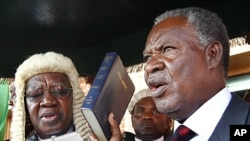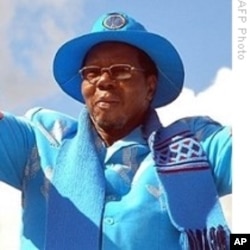The 15th Heads of state and government summit of the Common Market for Eastern and Southern Africa (COMESA) begins in Malawi’s capital, Lilongwe today (Monday).
COMESA is a regional trade bloc made up of 19 countries from eastern and southern Africa. The president of Malawi, Bingu Wa Mutharika, who currently heads the organization, is scheduled to chair the summit.
Analysts say the meeting is being overshadowed by the ongoing diplomatic spat between Lilongwe and Lusaka. This came after Zambia’s new President Michael Sata turned down an invitation saying “I find it extremely difficult to go to Malawi.”
Mr. Sata was deported from Malawi in 2006 by the Mutharika government after visiting former President Bakili Muluzi. He wants Lilongwe’s apology, ahead of today’s conference.
The Zambian daily paper, the Lusaka Times, quoted President Sata as saying “I went to Malawi to visit an opposition leader and your government bundled me into a (Toyota) Land Cruiser and said I am a prohibited immigrant. Your government has not been courageous enough to apologize, and therefore I find it extremely difficult to go to Malawi.”
Information Minister Patricia Kaliati denies “those rumors”, which she said suggests relations with Zambia has been strained since Mr. Sata was elected Zambia president.
“The bilateral relationship between Zambia and Malawi is still intact,” said Kaliati. She blames the media for “over blowing” the situation and described the alleged diplomatic tension as unfortunate.
Kaliati adds that the media has little role in executing bilateral relations with neighboring Zambia.
“If there is any issue, we know how to communicate from government to government and we have our bilateral relations through our embassies or through our foreign affairs. But also with the harnessing of technology, we have the VVIP [Very, Very Important Person], whereby heads of states can also communicate on their own,” said Kaliati. “So if there are issues, those are the areas and protocols, which we use in discussing. So the issue of neighborliness is intact and very good and if there are issues we know how to handle [them].”
Ralph Kasambara, attorney for Mr. Sata, says it is unlikely that the Malawi government will issue an apology to the Zambian leader, despite his efforts to encourage Lilongwe to do so.
“So far, we have heard nothing concrete from the [Malawi] government. The government has not provided any revocation of him [Mr. Sata] not entering into Malawi,” said Kasambara.” Secondly, we also wanted to know why Mr. Sata was prevented from entering Malawi when he was declared to be an undesirable element. Again, the government has not been forthcoming on that.”
Kasambara maintains that the Malawi government “erred” by deporting Mr. Sata since, he said, citizens of both countries do not need visas to cross the border.












